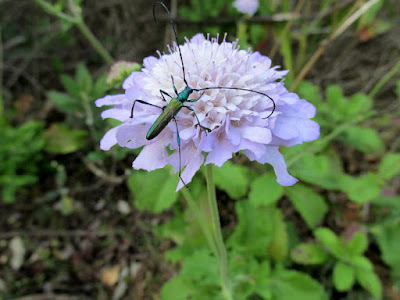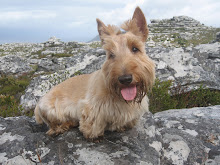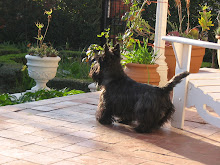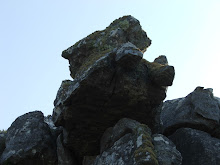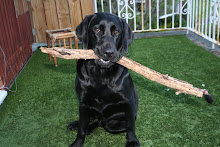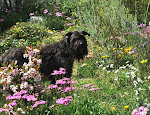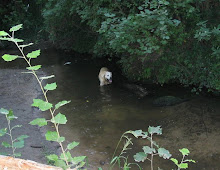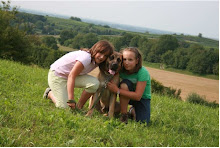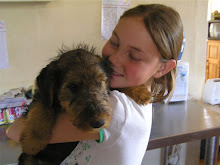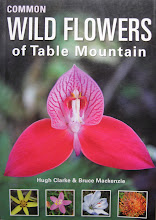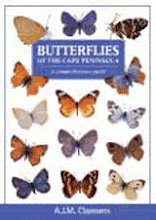It was great to have Sue and Honey back with us again today for our walk up Ou Kraal to Mimetes Valley.
Lots of moss growing on the cliff after the lovely rain we had yesterday.
And Christmas decorations festooning some of the plants. This is the False Dodder or Devil's Tresses (Cassytha ciliolata) that, weirdly, is related to Stinkwood trees in that they both belong to the family Lauraceae.
Far below us there was lots of whooping and ululating and we saw that there was some religious ceremony going on in the tidal pool.
The Food Lady was rather slow as there were just hundreds of phlowers to photograph. This is a Cape Scabious (Scabiosa africana) - one of several mauve flowers on the mountain this morning. The beetle is a Common Metallic Longhorn - one of the timber beetles.
Moraea tripetala clinging to the cliff.
These Rush Irises (Bobartia indica) overlooking Muizenberg have really enjoyed the burnt veld and are everywhere.
Most of the rare and endangered Tree Pagodas (Mimetes fimbrifolius) in Mimetes Valley were singed by the fire, but seem to be back on the road to recovery thanks to their thick, fire-resistant bark and their ability to re-grow from "epicormic shoots" that remain protected under the bark on the upper branches. They also re-seed, and there are lots of seedlings coming up everywhere -
including these leucadendron seedlings.
An unusual little Pelargonium pinnatum with characteristic withered leaves,
the Table Mountain Watsonia (Watsonia tabularis) starting to flower,
and there are still clumps of aristeas everywhere - these are probably Aristea bakeri.
Tea spot chosen after some bundu-bashing to get out of the rather chilly little breeze - and Harvey and Lad have us covered - no baboon or mountain mugger will surprise us!
Sue and Honey with the Alph - and Kalk Bay harbour and Fish Hoek in the background.
On the way back we saw lots of geelkalossies (Ixia dubia) all lit up and glowing in the veld.
Harvey was happy to find a pool for a quick cooling dip, and so was I as the sun was warm and the breeze doesn't reach us so low down.
Another flower slipped in by the Food Lady - Corymbium africanum - a member of the Asteraceae that looks a bit like a Pseudoselago (a member of the Scrophulariaceae) and not unlike a Scabious (Dipsacaceae). All attracting the same sort of pollinators perhaps?
Soon it was time to go down again - some of these rocks are quick big for a hot, plump, black Scot and I needed some help, although Laddie and Harvey went shooting ahead with the Alph.

This is my kind of path - soft, shady,
with the occasional flower (Watsonia borbonica) to take the Food Lady's attention away from me
when I smell something delicious and tempting and I need to leave the path to investigate.
Cover blown! Damn. Just as I was getting close to the bergie paté.




